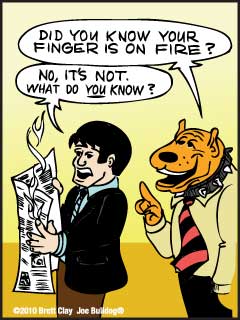Change Leadership — Secret # 102
People Must Learn on Their Own
The real voyage of discovery consists not in seeking new landscapes,
but in having new eyes. —Marcel Proust
What I Need to Know |
Do you wish your kids would listen to you? Why is it that when you say, “Don’t touch the burner, or you’ll get burned,” they proceed to touch the burner? The frustration can be excruciating.
It would be nice if your children were just in a developmental stage and at some point they simply “grew out of it.” But the reality is that they become adults—who still do not listen. Do you think you, the parent, are immune to this trait? Think about this: Do your parents listen to you? They are parents. But they can be as stubborn as teenagers or two-year-olds. Apparently, it is an inescapable human trait to have to learn by one’s own mistakes, rather than by the mistakes of others.
In your role as a change agent, you may advocate until you are blue in the face. But the stakeholders may not be listening. They think they know better, that you are exaggerating, or that you do not fully understand. “That burner is not hot. How do you know it’s hot? What do you know? My fingers feel fine.
I’m not worried about a little burner…OW!! THAT HURTS!!” Only after they feel the sting for themselves will they believe you.
The important question for the change agent becomes, “How and when will the stakeholders feel the pain?” In other words, “What event will be the catalyst for action?”
What I Need to Do |
First, determine if stakeholders are really listening. Is the message going in one ear and out the other? Or have they fully internalized the forces at play?
Second, if you believe the customer fully appreciates the need for change, ask him what event caused his “a-ha” moment. If he cannot describe a past experience that enables him fully to appreciate the need, then his conviction will be limited.
If the customer appears not to be listening, immediately cease and desist with your advocacy and switch into inquiry mode. You need to inquire into the customer’s views and identify an event that will be a catalyst for recognition and action.
Do not fool yourself by thinking your superior powers of persuasion and advocacy will convince the customer—as the CEO of a customer once told the VP of Sales at my company, “You’re just a sales guy. What do you know?”
The only thing that matters is the pain in the customer’s finger.
Action Summary |
|
 |



Social